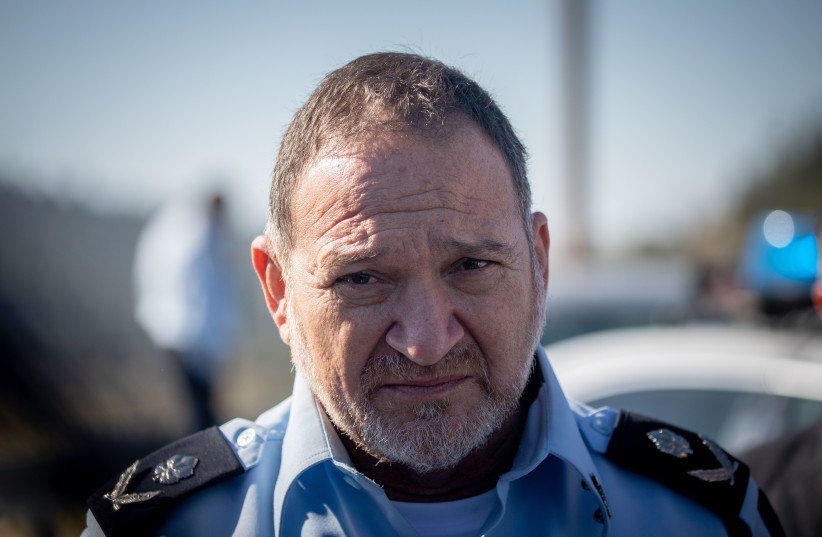The police on Tuesday night presented to Prime Minister Naftali Bennett, newly sworn-in Attorney-General Gali Baharav-Miara, Justice Minister Gideon Sa’ar and Public Security Minister Omer Bar Lev findings that it only tried to hack three cellphones from the list of the Calcalist report’s 26 alleged hacked persons, Channel 12 reported.
There will be an initial review of the police spying scandal’s findings by officials from the Mossad and the Shin Bet (Israel Security Agency), followed by a likely state inquiry, according to Channel 12.
In addition, the police said out of the three persons its cyber unit tried to hack, it was only successful in one case, and it was done legally.
Since Monday’s latest Calcalist disclosures, the political ground has shifted to focusing on what kind of a state inquiry to approve as opposed to whether Deputy Attorney-General Amit Merari’s criminal probe might be sufficient on its own.
The shift also had concrete consequences in the public corruption trial of former prime minister Benjamin Netanyahu. The prosecution on Tuesday requested postponing further witnesses until next Sunday to probe and clarify the latest police spyware scandal issues.

The Jerusalem District Court quickly approved the request, even though on Monday it had ordered the prosecution to provide an update on the police cellphone hacking allegations no later than 2:00 p.m. Tuesday.
The decision to seek a delay came as the prosecution has been on general notice of the issue for weeks and has faced a deadline since last Thursday.
The prosecution appeared so shaken up by the current situation, it was unclear what it would do minutes before the deadline.
It was unclear if the prosecution’s update on Sunday will lead to the trial restarting or if there will be an unspecified much longer delay fighting over whatever update the prosecution provides.
The prosecution is checking all relevant cellphones in Cases 1000 and 4000. It says no eavesdropping activities were taken or necessary in Case 2000 given that the key evidence was discovered in a court-approved physical search of former top Netanyahu aide Ari Harow’s cellphone.
But the defense has foreseen that it will not trust the prosecution’s findings and would demand that the NSO Group or some other outside authority do its own probe into the scandal.
On Monday, the testimony of Cable Authority legal adviser and witness Dana Neufeld finished an hour early when the court ordered the prosecution to provide an update on the police spying scandal by 2:00 p.m. Tuesday in place of an evening deadline.
Neufeld’s testimony was halted when the prosecution started to ask about text messages between her and Shlomo Filber, a former top Netanyahu aide turned state’s witness.
After losing two rounds of earlier arguments to halt hearing witnesses pending clarifications regarding the police cellphone hacking scandal, the defense finally convinced the judges that it would be unfair to let Neufeld refer to Filber’s texts, given that Filber’s texts may be at the center of the hacking saga.
Neufeld is an important witness for the prosecution since she was one of the few nonpolitical officials who signed off on the YES-Bezeq merger that is at the center of the Case 4000 media bribery charge against Netanyahu and Bezeq and Walla owner Shaul Elovitch.
With the situation continuing to get more serious, Israel Police Insp.-Gen. Kobi Shabtai said he had cut short his important visit to the UAE and was rushing back to Israel Tuesday night.
Meanwhile, Yediot Aharonot on Tuesday reported for the first time on the narrative of former police chief Roni Alsheich, although the report attributed the extensive response to sources close to him.
Alsheich has been taking an increasing beating in the public debate over the police cellphone hacking scandal as more details have been leaked to the press. Much of the increased power of the police cyber unit occurred on his watch of 2015-2018.
According to the report, Alsheich mostly considered cellphone hacking technology to be critical for combating terrorism, organized crime syndicates, pornography and solving some murder cases.
Like other police officials, he said cellphones were hacked with the approval of the Attorney-General’s Office and the courts.
In the report, one of the few cases of cellphone hacking that Alsheich addressed directly was in the criminal probe of Likud MK David Bitan.
Alsheich said he knew which judge had approved the cellphone hacking in that case.
He rejected allegations of illegal spying on journalists, activists and government officials, without giving other specific rebuttals.
Some of the allegations also occurred during the term of former police chief Moti Cohen in 2018-2020.
Cohen has not provided his narrative yet, though as an extended temporary chief, he is viewed by many as a less prominent figure in the scandal than Alsheich.
Also on Tuesday, it was disclosed that former Justice Ministry director-general Emi Palmor, former Finance Ministry director-general Shai Babad and former Transportation Ministry director-general Keren Tarnor had sent a letter to Bennett, Baharav-Miara, Sa’ar, Bar Lev and others to receive clarifications about allegations that the police had hacked their cellphones.
The letter referred to “horrifying revelations” from the Calcalist report about all of them being spied on without a criminal probe in place.
